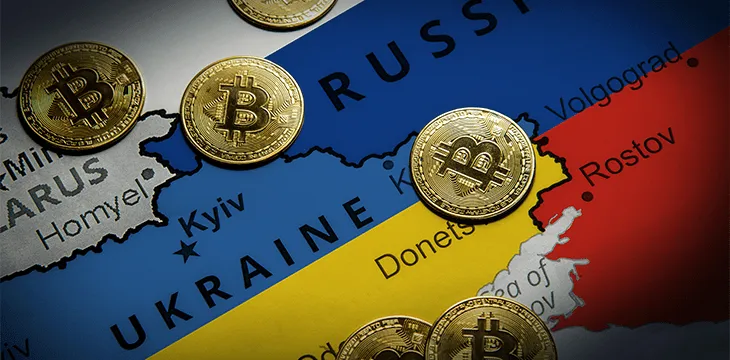|
Getting your Trinity Audio player ready...
|
The cryptocurrency community is actively promoting its response to Russia’s invasion of Ukraine, despite suggestions that this response may have been based more on self-interested speculation than on selfless support for a democratic nation struggling to remain independent.
On Monday, a group of “crypto”/Web3 luminaries held a Twitter Spaces discussion on the cryptocurrency community’s response to Russia’s unprovoked invasion of Ukraine late last month. Among those participating were Ethereum founder Vitalik Buterin, Jacob Horne (co-creator of blockchain platform Zora), Nadya Tolokonnikova (Pussy Riot member and UkraineDAO founder), Sam Williams (founder of ‘global permanent hard drive’ Arweave), plus Tomicah Tillemann and Chris Lehane (execs at Katie Haun’s new venture capital fund KRH Partners).
But the unquestioned star of the show was Oleksandr Bornyakov, Ukraine’s Deputy Minister of Digital Transformation, who revealed that some of the nearly $60 million (as of Monday) raised for Ukraine by various cryptocurrency initiatives had led to the purchase of around 400,000 military grade rations for Ukraine’s troops, along with “thousands” of bulletproof vests and other means of safeguarding those on the front lines of this conflict.
Bornyakov called cryptocurrency “a really great addition” to funds raised via more traditional financial channels, particularly given its capacity to ensure the funds raised can be used by Ukraine within a matter of minutes, not after several days’ delay imposed by mainstream banks.
This was a point echoed by many of the Spaces participants, who also stressed that donated cryptocurrency funds weren’t subject to the ‘leakage’ associated with mainstream fundraising platforms/organizations, which typically retain a portion of the funds raised to fund their own operations.
However, BTC and ETH—the primary cryptocurrencies through which funds were transferred to Ukraine—both impose significant fees for ensuring your transaction makes it into the next block. Moreover, most banks have waived wire transfer fees for Ukraine-bound fiat donations, an anti-leakage step that blockchain miners have yet to match.
It’s worth noting that transfers of Bitcoin SV—the original Bitcoin—can be made with blockchain fees measured in fractions of a penny. Given the widespread anger at the disinformation campaign being waged by Russia alongside its actual military effort, it’s sad that the campaign to discredit BSV that some of the Spaces participants have waged over the years appears cut from the same deceptive cloth. But we digress…
It may also be worth noting that despite the Spaces participants stressing the role that Web3 projects like NFTs and DAOs played in the pro-Ukraine effort, the bulk of the donations were made following pitches on that old Web2 standby Twitter. Just sayin’.
What’s in it for me?
Just so no one misunderstands: any method of getting support to Ukraine at this moment in history is an unqualified good. But while it’s true that digital currency raised millions for Ukraine, many of those donations were made after the official Twitter account of Ukraine’s government promised to airdrop a new token to all who donated. Donations dropped off precipitously on March 4, the day after the government announced that it was canceling the airdrop for unspecified reasons.
This dramatic decline strongly suggests the bulk of donations were made by toxic maxis looking for an easy payday if Ukraine’s new token managed to catch the public’s speculative interest. Worse, the wave of donations following Ukraine’s original announcement was made via a host of new wallets pledging minimal amounts of ETH, again, strongly suggesting a bunch of users attempting to game the system and collect more than one set of airdropped tokens.
Typically, some crypto bros lived down to their reputation by asking Ukraine to return their donations after the airdrop was scrubbed, just as some whined at being excluded from the original airdrop plan because Ukraine hadn’t bothered to include their token in the list of donation addresses. These bozos don’t necessarily tarnish the whole digital asset sector but they certainly don’t help disprove any negative stereotypes.
Much of the Spaces discussion revolved around the alleged simpatico relationship between Ukraine’s valiant stand against Russia and crypto bros’ tenets of freedom and democracy. In reality, many crypto bros have an anarchic worldview that stresses freedom from democracy, refusing to acknowledge any other rights than the ones they themselves possess and viewing collective decision-making as akin to slavery.
Can you locate Ethiopia on a map? How about Yemen?
Meanwhile, Western governments’ response to Russia’s aggression has been unprecedented, at least, in economic terms and their willingness to accept refugees fleeing the conflict. But many have noted that these same nations were far less eager to respond when the threat was further from European shores, and the people under attack didn’t, uh, look like them.
Digital currency’s collective willingness to intervene to help Ukraine is similarly unprecedented and thus subject to similar claims of self-interest. Several of the Spaces participants commented on the fact that many crypto bro founders—including the Russian-born Buterin—have Ukrainian or other Eastern European heritage.
Bornyakov reminded the Spaces participants that Ukraine ranked fourth in Chainalysis’ 2021 Global Crypto Adoption Index and was home to many digital currency-related projects. As such, the digital currency sector has more than a passing interest in seeing Ukraine remain free and continuing to demonstrate digital currency use cases.
Exchanging positions
To be sure, digital currency isn’t giving Ukraine everything it’s asked for. On Tuesday, Bornyakov told Reuters that exchanges that refuse Ukraine’s request to cut off their Russian customers—including Binance, Coinbase and Kraken—will eventually pay a price from consumers who support Ukraine and won’t forget those who failed to take their side.
Whether or not that prediction comes to pass, in the short term, Binance CEO Changpeng ‘CZ’ Zhao appears far more concerned with catching a dose of Putin Polonium™ than anything Western society can throw at him. CZ sounded downright apologetic on Tuesday as Binance announced that Russian customers would no longer be able to use Mastercard or Visa for transactions after the two financial giants cut their ties with Russia.
And it wasn’t so long ago that Coinbase was bragging about BTC being “immune to country-specific sanctions (e.g. Russia-Visa).” Fast forward to yesterday and Coinbase’s chief legal officer Paul Grewal penned a blog post titled ‘Using Crypto Tech to Promote Sanctions Compliance.” (La plus ça change…) Despite this change of heart, Grewal left open a Putin-sized escape hatch by noting that “no compliance program is perfect, including ours.”
Waiting for the other shoe to drop
Beyond Ukraine’s desire to force its much larger neighbor to retreat back beyond its borders, Bornyakov suggested that one positive outcome of the current conflict could be a greater push for digital currency regulation in other countries. Bornyakov noted that Ukraine’s parliament had approved its Law on Virtual Assets mere days before Russia invaded, helping Ukraine make its digital currency donation pitch.
With U.S. President Joe Biden expected to issue an executive order on crypto regulation this week, many “crypto” figures are concerned that (largely unwarranted) fears over Russian oligarchs using digital currency to dodge the West’s economic sanctions may unduly influence the contents of Biden’s order. Whatever Biden has in store for the sector, you can expect them to paint themselves as being on the side of right and reason, so long as it’s the side that benefits them here and now.

 04-18-2025
04-18-2025 





